Animals-and-Pets

BBC Wildlife
Do animals know first aid?
LIFE IS FULL OF HAZARDS FOR EVERY WILD animal - and injuries involving open wounds can often lead to a slow death from infection, unless licking the site alone is sufficient to keep it bacteria-free. But scientists in Uganda have witnessed a more sophisticated approach to wound care and social wellbeing practised by eastern chimpanzees in Budongo Forest, in the country’s Western Region.
1 min |
September 2025

BBC Wildlife
"They're everywhere. Above, below, slicing through the blue"
Grey reef sharks in French Polynesia
2 min |
September 2025

BBC Wildlife
Why are deep sea animals so big?
THE DEEP SEA IS BY FAR THE LARGEST habitat on Earth. It is, says Natalie Lawrence in her book Enchanted Creatures, \"the last wilderness vast enough to hide monsters\".
2 min |
September 2025

BBC Wildlife
COME FLY WITH ME
The sizeable forest insect that glides because its life depends on it
3 min |
September 2025

BBC Wildlife
Meet The Wild Ones
Follow epic expeditions to find rare species
1 min |
September 2025
BBC Wildlife
CALL OF THE WILD
From tweets to underwater songs, discover the astonishing ways animals use sound to survive and thrive
8 min |
September 2025

BBC Wildlife
COME TOGETHER
ASIAN ELEPHANTS Hundreds of huge pachyderms gather to feed, drink and socialise during Sri Lanka's dry season
2 min |
September 2025
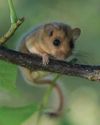
BBC Wildlife
Are new laws a threat to nature?
New legislation to tackle river pollution could bring with it a whole new set of problems
5 min |
August 2025

BBC Wildlife
The bullet ant
ALL YOU EVER NEEDED TO KNOW ABOUT
4 min |
August 2025

BBC Wildlife
7 nature encounters for the month ahead
PODS OF ORCAS ARE DRAWN TO the coasts of northernmost Scotland in the summer months, lured by plentiful prey - especially seal pups. When on the hunt, they can come thrillingly close to rocky headlands, and sightings appear to be increasing.
3 min |
August 2025
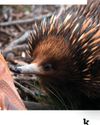
BBC Wildlife
"It sniffed at my hiking boot and tickled my bum with its snout"
An echidna in Mulligans Flat
2 min |
August 2025
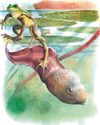
BBC Wildlife
BABY COME BACK
This amphibian's colossal tadpole shrinks down into adulthood
3 min |
August 2025

BBC Wildlife
SNAP-CHAT
Adventures above the Arctic Circle with bird lover Knut-Sverre Horn
2 min |
August 2025
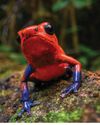
BBC Wildlife
Why don't poisonous animals poison themselves?
THERE WOULD BE LITTLE POINT IN having the ability to lethally poison a predator if you accidentally poisoned yourself and ended up just as dead. In the case of poison dart frogs, they dodge being poisoned twice in the process of protecting themselves. Initially, the frogs ingest a toxin from the ants, mites and centipedes they consume, which have been eating poisonous plants. Though research on the subject is ongoing, scientists believe the ant toxins don't harm the frogs because of a protein in their gut, which is released as the ants are digested and interacts with the poison.
1 min |
August 2025

BBC Wildlife
Sir David tells 'Our Story'
New exhibition opens at Natural History Museum
1 min |
August 2025

BBC Wildlife
New urban jungles
Moves to integrate wildlife biodiversity into the built environment are gaining momentum
6 min |
August 2025
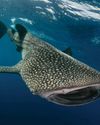
BBC Wildlife
SPIRIT ON THE WATER
They are the gentle giants of the ocean, but how whale sharks feed and breed is anybody's guess
2 min |
August 2025

BBC Wildlife
PARROTS OF THE CARIBBEAN
Caribbean parrots face threats from poaching, but a reintroduction programme in Aruba is giving one group of yellow-shouldered amazons a second chance
6 min |
August 2025

BBC Wildlife
What is tree-creep?
STUDIES OF ANCIENT PLANTS HAVE shown that they react to changing climates by moving. While a single plant of course cannot move itself over large distances, seeds are often highly mobile. They can be carried by wind, water and animals to new locations. And when they put down roots in more hospitable climes, the seeds of these lucky survivors can further advance into that region. This has been going on for millennia and entire ecosystems have shifted their ranges in response to changing environmental conditions.
1 min |
August 2025

BBC Wildlife
CONGO UNCOVERED
Camera-traps reveal the wondrous, rarely seen species of the mysterious Congo rainforest
7 min |
August 2025

BBC Wildlife
WILD IN THE CITY
Austin, Texas has North America's largest urban bat colony – and it's home to a bat dance like no other
2 min |
August 2025

BBC Wildlife
Why does Australia have so many venomous animals?
AUSTRALIA HAS A REPUTATION for being full of deadly wildlife - and with good reason. The vast antipodean island is home to an impressive list of dangerous critters.
2 min |
August 2025

BBC Wildlife
KATE BRADBURY
“Never has it been so important to save our sea beds”
2 min |
August 2025

BBC Wildlife
Australian moths navigate using the stars
The bogong moth migrates up to 1,000km using the Milky Way as a guide
1 min |
August 2025

BBC Wildlife
REWIGGLING A RIVER
Restoring rivers to more natural shapes has huge benefits for wildlife - as one project in the Cairngorms demonstrates
7 min |
July 2025

BBC Wildlife
What happens to rainforests if there's no rain?
THE HEAVY RAINFALL THAT POWERS rainforests is caused by the complex interaction of multiple geographic and climatic factors, including mountain ranges, ocean and wind currents, and the intensity of solar exposure. The forests themselves contribute to rainfall, with evaporation from plant biomass contributing significantly to the water cycle.
1 min |
July 2025

BBC Wildlife
LIFTING CRANES
The tallest flying bird in the world owes its survival to a special relationship with small farmers in the most populated part of India
7 min |
July 2025
BBC Wildlife
Elk could return to the UK after 3,000 years
The first stage of a new rewilding project plans to introduce elk to enclosures in the East Midlands
1 min |
July 2025

BBC Wildlife
Is horseshoe crab blood really blue?
BEYOND THEIR ODD APPEARANCE AND ancient history, there is another thing that makes horseshoe crabs stand out from the crowd: their bright blue blood.
1 min |
July 2025

BBC Wildlife
KATE BRADBURY
“In folklore, the Oak King and Holly King battle on each solstice”
2 min |
